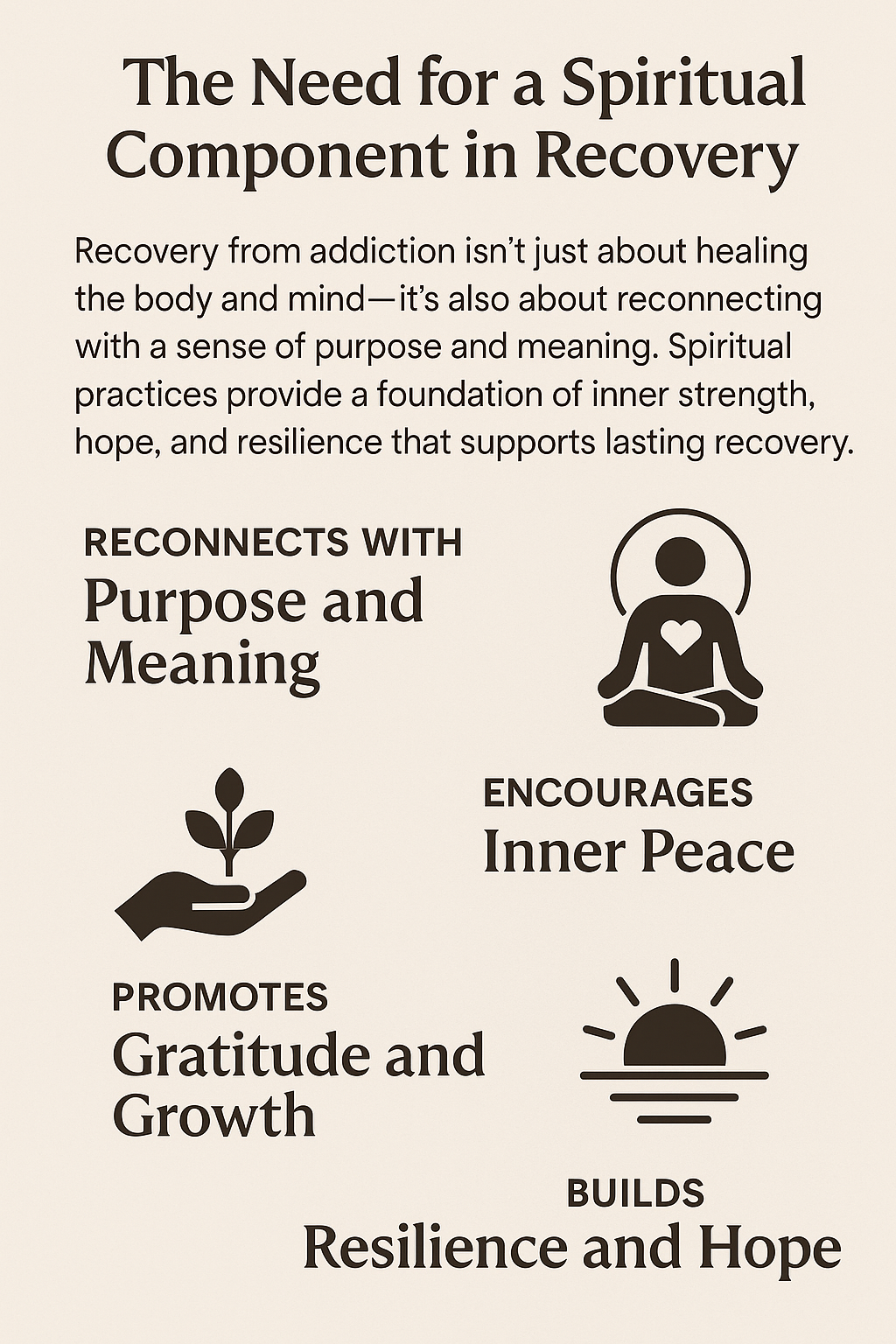Building a strong recovery plan can truly transform your life, whether you’re facing addiction, trauma, or another major challenge. Most recovery approaches focus on the physical and mental aspects—which are essential—but they often overlook something equally powerful: the spiritual side of healing. Adding a spiritual component isn’t about religion or rituals; it’s about reconnecting with purpose, peace, and something greater than yourself. For many, this means rediscovering hope, forgiveness, gratitude, and the sense that life has meaning beyond pain or struggle. Spirituality can ground you when recovery feels shaky and help you rebuild a sense of wholeness that extends beyond behavioral change. In this piece, I’ll explore how nurturing your spiritual well-being can strengthen your recovery and offer simple ways to integrate it into your daily life—through reflection, mindfulness, connection, and acts of compassion.
Why a Spiritual Component Matters in Recovery
Spirituality often surfaces in conversations about recovery, and it’s more than just a nostalgic reference to old traditions. Numerous studies have demonstrated that individuals who connect with their spiritual side are more hopeful and recover more quickly from life’s setbacks. Spirituality provides a sense of belonging, motivation to persevere, and comfort during challenging times. When you’re facing significant life changes, having a spiritual anchor can help calm your mind and guide your decisions.
For loads of people, this feeling of connection is why groups such as Alcoholics Anonymous rely so much on spirituality. Harvard’s T.H. Chan School of Public Health found that recovery programs encouraging a personal spiritual practice often yield better results and lower relapse rates when stress and challenges arise, and spiritual practices serve as healthy coping tools.
Understanding What “Spiritual” Actually Means
Some people tense up when they hear “spiritual.” But don’t worry — spirituality isn’t the same as religion. While religion is about specific beliefs or rituals, spirituality is more about searching for meaning, building connections with others or the universe, and holding onto your core values. For some, this may involve praying, meditating, or attending a place of worship. For others, it might look like sitting quietly in nature, journaling, helping out at a local shelter, or spending time with family.
- Purpose: Spirituality helps you answer, “Why am I here?” and “What brings meaning to my life?”
- Connection: Feeling like you’re part of something greater — a community, humanity, or the natural world — can be grounding.
- Personal Growth: It fosters forgiveness, gratitude, and acceptance, all of which greatly aid in rebuilding life after difficult times.
How Spiritual Practices Strengthen Real-World Outcomes
Adding a spiritual touch to your plan does more than soothe you in challenging moments. People often say their mood, motivation, and relationships all get a lift. Programs like 12-step recovery and SMART Recovery also address this effect. A survey by the Substance Abuse and Mental Health Services Administration showed that tapping into spirituality can ease anxiety, stress, and even emotional pain from the past.
This isn’t just talk — plenty of folks digging out from substance use or trauma rely on spiritual habits to deal with cravings or tough days. Swapping out old, unhelpful patterns for mindful habits, such as meditation or gratitude, can steer your ride in a much better direction. No matter which practices you choose, nurturing your spirit provides an additional layer of strength to help you keep moving forward on your recovery journey.
Practical Spiritual Tools for Your Recovery Plan
You don’t have to be an expert or take hours out of your day to add some spiritual support. Check out these ideas people find super helpful:
- Meditation: Even a quick five minutes can really clear your head, prepping you to tackle stress and triggers.
- Gratitude Journaling: Writing down one thing you appreciate each day helps shift your focus from fear to progress and hope.
- Connecting to Nature: Being outdoors — whether you’re hiking, sitting by the water, or just noticing the sky — can help you get grounded and mindful.
- Community Support: Joining a spiritual group, book club, or simply texting with a friend can make the ride less lonely.
- Art and Music: Getting creative with art or music brings peace and taps into a different corner of your mind.
Try out a few, see what resonates, and notice even small shifts. There’s no set pattern — it’s all about what supports your growth and feels right for you.
Common Myths and Concerns Around Spirituality in Recovery
Many people wonder if spirituality is truly for them. Here are some things I hear most often:
- “I’m not religious.” That’s absolutely fine; spirituality isn’t tied to any belief or tradition. You can start with quiet thought, a walk in the woods, or reading about purpose.
- “I don’t have time.” Time is tight for everyone, but spiritual practice doesn’t need to be a big deal. Even just a couple of minutes of mindful breathing, stretching, or kindness can make a difference.
- “I’m not sure how to begin.” Try out simple habits — such as journaling, joining a supportive group, or reading something uplifting. You don’t have to get it perfect on the first try!
Addressing Uncertainty With Openness
Staying curious and open usually brings better results than forcing a new habit. If something feels off, it’s okay to try something else; there’s a wide variety of spiritual practices available. Many people start skeptical but slowly notice how small daily moments, repeated over time, can make life brighter and help you stay steady through storms.
Integrating Spirituality With Other Parts of Recovery
Your recovery is about your mind, your body, and your inner self. When you incorporate spiritual growth, everything becomes stronger. Check out some ways to weave spiritual tools with other supports:
- Addiction Recovery: Meditation, breathwork, or a few moments of quiet can be life-saving when an urge strikes, breaking a cycle before old habits sneak in.
- Mental Health: Reflective practices, such as journaling or practicing kindness, can boost moods, help alleviate anxiety, and naturally complement counseling and medication.
- Trauma Healing: Focusing on forgiveness or self-acceptance through spiritual practices can gently guide healing and help you build self-compassion.
Combining spiritual ideas with therapy, community, or medical treatments helps treat the whole you, not just one part.
Real-Life Examples and Personal Reflections
I’ve watched people make giant leaps in their recovery when they start something small — a daily gratitude list, a mindful meditation before breakfast, or meeting once a week with a group that inspires them. Personally, setting aside a few moments each morning for quiet reflection brightens my mindset for the entire day. One good friend, who said she never “got” spirituality, found peace just by walking her dog at sunrise every day. That short walk became her anchor and a touchstone for growth and peace while she healed.
All of these stories come down to the same thing: finding meaning and building hope. Adding a spiritual angle to your recovery isn’t just about following steps — it’s about growing into a life that feels more expansive, richer, and genuinely your own.
Frequently Asked Questions
Question: Is spirituality exclusive to people with a religious background?
Answer: Not at all! In recovery, spirituality is about finding meaning and connecting with something, rather than adhering to particular beliefs or rituals.
Question: Can I add a spiritual component if I’m in therapy or taking meds?
Answer: Absolutely! Spiritual tools and practices can be integrated alongside therapy, medication, and other healing methods. Each approach complements the others, offering additional ways to care for yourself.
Question: What if spiritual practices don’t seem to help me?
Answer: That’s normal — not every habit works for everyone. Try out different options, such as art, music, meditation, or volunteering. Over time, you’ll find what connects with your needs and style.
What It All Means For Your Recovery Plan
Putting a spiritual slant on your recovery isn’t about following rules or adhering to set traditions. It’s your shot at finding comfort, hope, and a sense of purpose as you grow. By trying out simple practices and seeing what lifts you, you can create a plan that benefits you both inside and out. There’s no “one-size-fits-all” tool, but adding even a little spiritual support can make your load lighter — one day, one step at a time.
Video: How Spirituality Makes Recovery Possible

